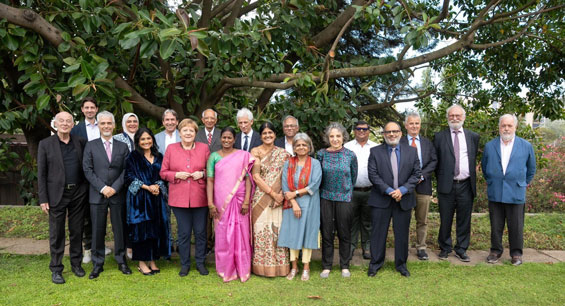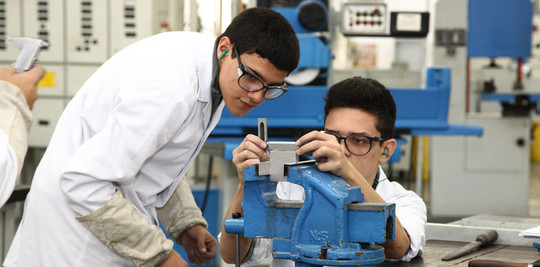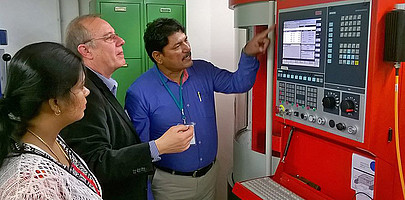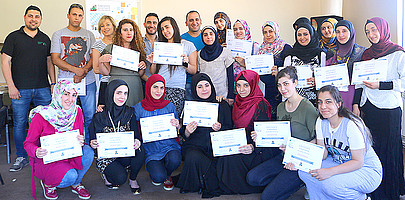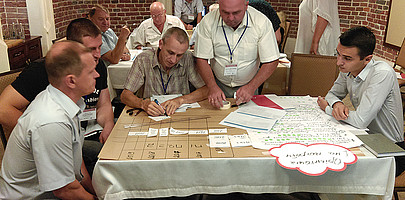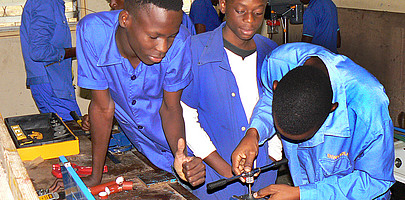Vocational education and training
VET – made in Germany!
Dual vocational training system in Germany is regarded as a benchmark globally for comparing performance when it comes to the quality of training and its acceptance in the wider world of business and the economy.
As Bildungswerk der Bayerischen Wirtschaft (bbw), we have been engaged with all aspects of vocational training for almost 50 years. In international projects, we can therefore tackle the following key topics with our experts along with our local partners:
- Adapting the content of syllabuses to the needs of business
- Qualification of the teaching staff
- Methodology and didactics of vocational training
- Professional and appropriate evaluation and monitoring of the training
- Adaptation of training to specific target groups
- Examination, certification and qualification framework
Principles become transferable quality principles
Every year, thousands of young people, as well as vocationally experienced adults from diverse industries and specialist fields receive training and education in the bbw Group. The key principles of dual training, unique methods and didactics tailored to the target group as well as orientation to requirements in the real labour market are at the forefront here.
Yet for us, dual vocational training does not entail exclusively directing our primary focus to the around 330 training occupations regulated by law in Germany. We also apply the fundamental quality principles that have contributed to the internationally excellent reputation of German vocational training to all programmes for qualification existing outside German vocational training legislation:
- Training programmes in other countries
- Partial qualification programmes (www.nachqualifizierung.de - only in German)
- Company-specific programme
What is VET (Vocational Educational Training) - made in Germany?
The model of dual vocational training practised in Germany for more than 100 years can only be exported to other countries over time. This frequently requires a certain degree of adaptation to external situations on account of different cultural, social and economic framework conditions.
The heart of the matter involves recognising the factors that make this system so beneficial and valuable, adapting them to prevailing local conditions and incorporating them step-by-step in the training process there.
The success factors for “VET - made in Germany” from the viewpoint of the bbw Group are:
Demand is oriented towards the real economy: The aim of all vocational training is employment in the jobs market. The courses offered therefore need to be oriented to the real economy – in terms of both quality and quantity. To this end, it is necessary to ensure continuous exchange between those responsible (business and the educational sector), so as to communicate current and future requirements to qualified experts.
Two learning venues: The dual German vocational training system is frequently portrayed as a combination of theory and practice. This oversimplification leads to misunderstanding – since the quality of the system results from a division into two learning venues: Vocational schools (or training centres) as well as real-life practice (companies). This is because in training centres practical knowledge is also sometimes imparted in class rooms, while theoretical skills are practised in workshops. Yet real practical knowledge, as well as modern technological resources, can only be applied in the real world of work. It is therefore necessary to divide learning content clearly into the learning venues school and company.
Quality of the training personnel: There is no such thing as good training without qualified teaching staff. This applies to both training and further education for teaches in schools as well as training personnel in companies. A learning process is not possible without qualified supporters.
Independent checks: As a rule of thumb: Nobody tests the person they’ve trained! Certificates and performance validations only gain universal validity and recognition if they are compiled, implemented and evaluated by neutral test committees. Ideally, joint test committees are made up of representatives from companies and schools.
Continuous professional and appropriate evaluation/monitoring: A vocational training system cannot be static. In Germany, around ten percent of vocational trainers are reoriented to practice, retrained or retired from service. This ensures the high value of training and calls for continuous adaptation to the labour market. As a result, the effectiveness of the system must be continually estimated by independent committees in order to initiate the necessary improvements.
All these steps cannot be realised from the start in any project. However, it helps to keep these targets in mind for orientation during the first small steps. To realise these goals, the bbw Group offers skills and expertise from 50 years of experience in vocational training.


